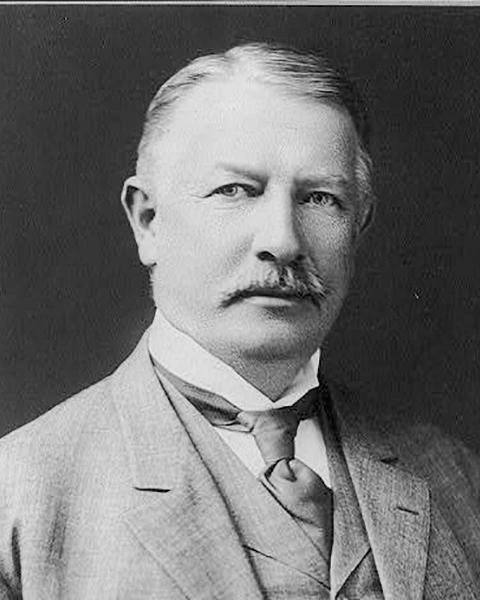Last updated: September 2, 2023
Person
Charles Carroll Glover

Library of Congress
Early Life
Charles Carroll Glover was born in North Carolina, but moved to Washington, DC at the age of 8 to live with his paternal grandparents.
He grew up to be a banker and worked at Riggs and Company as a teller in 1866. He eventually became bank president and was heavily involved in the financial decisions of the United States. He was frequently seen at the White House and was often the banker used by presidents.
Family
Glover married Annie Cunningham Poor on January 10, 1878. Before the year was out, they welcomed their first child, a daughter they named Elizabeth Lindsay Glover.
Elizabeth married Reneke de Marees van Swinderen, a Dutch diplomat and politician, in 1904. They had two children, Anna Judith Elisabeth Demarees Vanswinderen and Reneke Caroll Demarees Vanswinderen. Their son died at the age of ten. Anna married Frederick Robert Hoyer Millar, a british ambassador to the United States during World War II who was made Baron Inchyra in 1962. Their descendents have continued as Baron Inchyra into the 21st century. Elizabeth died in 1950 at the estate her father had created in Washington, DC near present day Ward Circle.
In 1888, they had a son, Charles Carroll Glover, Jr. He followed in his father's footsteps as a banker and philanthropist. He died in 1976.
Philanthropy and Development
Charles C. Glover was heavily involved in improvements to the City of Washington. As early as 1881, Glover advocated for the reclamation of the Potomac mud flats that extended to the west and south of the Washington Monument. His efforts paved the way for the creation of Hains Point, the Tidal Basin and Potomac Park. WIthout his efforts, the McMillan Plan never could have been made.
In 1888, Glover's city improvement work turned towards the creation of Rock Creek Park. He partnered with Crosby Stuart Noyes (a newspaper publisher) and Calderon Carlisle (lawyer) to lobby congress to create both the National Zoo and Rock Creek Park in 1890. He was also a member of the city's most politically powerful organization, the Washington Board of Trade.
Glover's contributions to parkland include a donation of land in conjunction with Anne Archbold (which created Glover Archbold park), development of Massachusetts Avenue and Embassy Row, and development of the National Cathedral and grounds.
His involvement with the development and creation of parkland is a major factor in the existance of Rock Creek Park. Glover Road was named to honor him.
